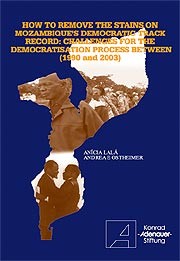Jednotlivý titul
Since the Third Wave of Democratization broke along African shores, many books and articles have been written about the particular transition processes. Nevertheless, ten years down the line there is still a lack of comparative research on a sound methodological bases and a deficit in elaborate case studies. Konrad-Adenauer-Stiftung – a German political foundation – started in 2002 a series of assessments on democratisation processes in Sub-Sahara-Africa.

On the basis of a common set of questions, the state and problems of democratic transition were analysed in order to enable a cross-country comparison. A first set of studies started in 2002 and covered Zimbabwe, Kenya, Nigeria and Burkina Faso. In 2003 the number of case studies was extended to Malawi, Mozambique, Zambia. Decisive for the selection of the case studies became their defunct character of the democratisation process. In all seven countries the democratic transition process was either never successfully accomplished or was, after a very promising beginning, sooner or later reversed. To some degree the countries democratization process can even be labeled an “extended process of transition”.
The comparative approach of the study aims to highlight differences in the democratization processes as well as to identify commonalities and roots for the problems encountered. Besides, the qualitative analysis attempts to provide an academic foundation for the development of adequate policies in support of democracy in Africa in general and for Konrad-Adenauer-Stiftung in particular.
The seven case studies were conducted by teams of German and African scholars; the latter originating from the country under review. As a qualitative measurement of democracy, the studies are based on personal observations, approximately 200 interviews and secondary sources that also encompassed empirical data gained from various surveys.
Drawing on the paradigms of democracy by Robert A Dahl and Larry Diamond the analyses focuses on political competition and participation, civil and political rights, political and civil pluralism, the rule of law, and checks and balances. Additionally, the studies address aspects of political culture and the behavior of key actors. In order to avoid the shortcomings of a mere assessment of the status-quo which would fall short of identifying underlying causes for obstacles in the democratic consolidation, the analyses emphasize the process character and take into account developments within the transition process and historical legacies that still might impact on.
The study on Mozambique’s democratization process comes at a time when the country is moving to another crucial stage of its democratisation process. Ten years after its first multiparty elections Mozambique can be characterized as an electoral democracy with regular, free and more or less fair elections. However, the consolidation of its democratic structures has continuously been challenged by a political culture shaped by neo-patrimonial structures and endemic corruption within the state apparatus. This not only impacts negatively on the sustainable development of the country requiring stable and accountable political institutions. It also affects the relationship state-society and leads to an erosion of the state’s legitimacy. An increasing discontentment has already been noticed in the latest Afrobarometer Survey where 39% of the interviewees characterized the political system as a democracy with major deficits and only 10% saw Mozambique as a fully entrenched democracy. So far, this rather skeptic attitude has not resulted in high voter abstentions in national elections (1999: 69.5%). However, the still low voter turnout in the 2003 local elections – only 24.16% did bother to vote - should be read as a sign of warning for those entering the political competition in 2004.


